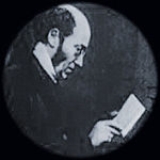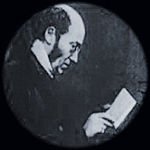
William Thoms
Encyclopedia

British people
The British are citizens of the United Kingdom, of the Isle of Man, any of the Channel Islands, or of any of the British overseas territories, and their descendants...
writer credited with coining the term "folklore
Folklore
Folklore consists of legends, music, oral history, proverbs, jokes, popular beliefs, fairy tales and customs that are the traditions of a culture, subculture, or group. It is also the set of practices through which those expressive genres are shared. The study of folklore is sometimes called...
" in the 1840s. Thoms's investigation of folklore and myth led to a later career of debunking longevity myths. Hence, he is the "father of age validation research" to demographers
Demography
Demography is the statistical study of human population. It can be a very general science that can be applied to any kind of dynamic human population, that is, one that changes over time or space...
.
Life
Thoms was an antiquary, and miscellaneous writer, for many years a clerk in the secretary's office of Chelsea Hospital. He was made a fellow of the Society of AntiquariesSociety of Antiquaries of London
The Society of Antiquaries of London is a learned society "charged by its Royal Charter of 1751 with 'the encouragement, advancement and furtherance of the study and knowledge of the antiquities and history of this and other countries'." It is based at Burlington House, Piccadilly, London , and is...
and became secretary to the Camden Society
Camden Society
The Camden Society, named after the English antiquary and historian William Camden, was founded in 1838 in London to publish early historical and literary materials, both unpublished manuscripts and new editions of rare printed books....
in 1838. In 1845 he was appointed Clerk, and subsequently Deputy Librarian, to the House of Lords
House of Lords
The House of Lords is the upper house of the Parliament of the United Kingdom. Like the House of Commons, it meets in the Palace of Westminster....
. He was the founder in 1849 of Notes and Queries
Notes and Queries
Notes and Queries is a long-running quarterly scholarly journal that publishes short articles related to "English language and literature, lexicography, history, and scholarly antiquarianism". Its emphasis is on "the factual rather than the speculative"...
, which for some years he also edited.
Thoms is credited with inventing the word 'folklore' in an 1846 letter to the Athenaeum
Athenaeum (magazine)
The Athenaeum was a literary magazine published in London from 1828 to 1921. It had a reputation for publishing the very best writers of the age....
. He invented this compound word to replace the various other terms used at the time, including "popular antiquities" or "popular literature". He was fond of the works of Jacob Grimm
Jacob Grimm
Jacob Ludwig Carl Grimm was a German philologist, jurist and mythologist. He is best known as the discoverer of Grimm's Law, the author of the monumental Deutsches Wörterbuch, the author of Deutsche Mythologie and, more popularly, as one of the Brothers Grimm, as the editor of Grimm's Fairy...
, which he considered remarkable.
His first book, Early Prose Romances (3 vol. 1827-1828), was published with encouragement from Francis Douce
Francis Douce
Francis Douce was an English antiquary.-Biography:Douce was born in London. His father was a clerk in Chancery. After completing his education he entered his father's office, but soon quit it to devote himself to the study of antiquities...
, and gave versions of English tales such as "Robert the Devyl, Thomas a Reading, Friar Bacon, Friar Rush, Virgilius, Robin Hood, George a Green, Tom a Lincolne, Helyas, and Dr. Faustus".
Among his publications are Lays and Legends (1834), The Book of the Court (1838), Gammer Gurton's Famous Histories (1846), Gammer Gurton's Pleasant Stories (1848). He also edited Stow's Survey of London in 1842.
Thoms was a leading member of the Folklore Society
Folklore Society
The Folklore Society was founded in England in 1878 to study traditional vernacular culture, including traditional music, song, dance and drama, narrative, arts and crafts, customs and belief...
, founded in 1878, though his involvement in its establishment is poorly investigated.
In the 1870s, William Thoms began investigating claims to "ultra-centenarianism." His essays and in particular his book, Human Longevity: Its Facts and Fictions (1879) make William Thoms the "father of age validation research," especially relevant to the topic of supercentenarians.
Thoms is buried in Brompton Cemetery
Brompton Cemetery
Brompton Cemetery is located near Earl's Court in South West London, England . It is managed by The Royal Parks and is one of the Magnificent Seven...
, London
London
London is the capital city of :England and the :United Kingdom, the largest metropolitan area in the United Kingdom, and the largest urban zone in the European Union by most measures. Located on the River Thames, London has been a major settlement for two millennia, its history going back to its...
.
William John Thoms
Works
Thoms is associated with many publications, as editor, compiler or author. He used the pseudonym Ambrose Merton for several works.He began a column titled Folk-Lore in Charles Wentworth Dilke
Charles Wentworth Dilke
Charles Wentworth Dilke was an English liberal critic and writer on literature.-Professional life :He served for many years in the Navy Pay-Office, on retiring from which he devoted himself to literary pursuits.- Literary life:...
's Athenaeum in 1846, the same publisher encouraged him to begin Notes and Queries and was editor of this until 1872. His early attempt to produce a collection of folk tales, advertised as "Folk-Lore of England", did not appear, but his later antiquarian publications sometimes reprinted his articles and material from subscribers.
The following is an incomplete list of works:
- The Book of the Court, 1838
- Anecdotes and Traditions illustrative of Early English History and Literature from Manuscript Sources, Camden Society 1839.
- Stow's Survey of London (London, 8vo), 1842 ed.
- In he prepared for the Early English Poetry series (Percy Society) The History of Reynard the Fox, 1844, (Caxton in 1481)
- Gammer Gurton's Famous Histories of Sir Guy of Warwick, Sir Bevis of Hampton, Tom Hickathrift, Friar Bacon, Robin Hood, and the King and the Cobbler (Westminster, 16mo)
- Gammer Gurton's Pleasant Stories of Patient Grissel, the Princess Rosetta, and Robin Goodfellow, and ballads of the Beggar's Daughter, the Babes in the Wood, and Fair Rosamond (Westminster, 16mo).
- Primeval Antiquities of Denmark London, 1849. translating Jens Jacob Asmussen Worsaae
- The Longevity of Man. Its Facts and Its Fictions. With a prefatory letter to Prof. Owen, C.B., F.R.S. on the limits and frequency of exceptional cases. London: F. Norgate, 1879.
Sources
External links
- Intro to folklore
- The old story books of England, 1845
- Roper, Jonathan 'Thoms and the Unachieved "Folk-Lore of England"', Folklore, 118:2, 203 - 216
Attribution

